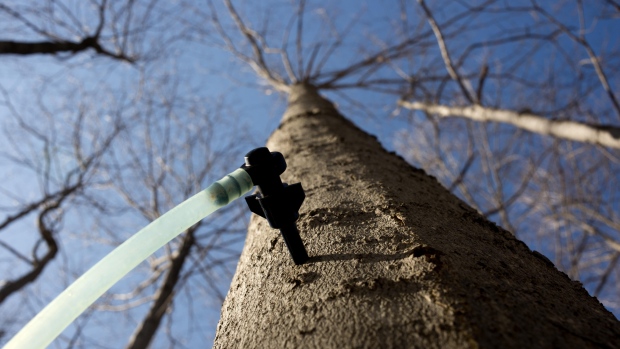May 28, 2019
Canada’s syrup cartel challenged by Vermont’s 'maple on steroids'
, Bloomberg News

(Bloomberg Businessweek) -- If you think you enjoyed maple syrup with your breakfast this morning, you may well be wrong. America’s favorite pancake topper — Aunt Jemima, a PepsiCo brand that last year reached 132 million consumers — is, in fact, made of corn syrup. It contains zero maple tree sap. The same is true of the two other top-selling syrup brands, Mrs. Butterworth’s and Log Cabin.
If, however, you poured “pure maple syrup” this morning, then there’s a good chance you were using the product of a cartel. More than 70 per cent of all maple syrup sold worldwide, and most of the maple syrup consumed in the U.S., comes from a single Canadian conglomerate, the Federation of Quebec Maple Syrup Producers. The OPEC-like entity at last count was holding 7.5 million gallons in barrels, waiting for prices — currently at about US$33 per gallon — to rise.
Is the US$500 million maple syrup industry ripe for a new brand steeped in wholesome artisan charisma? A small Vermont company thinks it is. Maple Guild, which says it tripled its sales last year, is now jockeying to make millions by becoming the largest supplier of single-source organic maple syrup in the U.S. It produces about 200,000 gallons of syrup a year and turns about half of that amber bounty into specialty products such as coffee-infused and salted caramel-infused syrups, both of which began selling at over 1,000 WalMart stores nationwide in March. Other Guild products — maple vinegar, for instance — hit the shelves of Albertson’s, Harris Teeter, and Whole Foods last year, along with 8.5-ounce bottles of straight-up syrup for US$10.
Among stateside producers, Maple Guild is uniquely flush. Originally owned by Massachusetts Mutual Life Insurance Company, it was sold last year for an undisclosed sum to Fiera Comox, the agricultural division of Fiera Capital, a Montreal investment firm that manages more than US$100 billion in assets. On its 24,000 acres of Vermont woodland, Maple Guild boasts 460,000 maple taps, or about twice as many as the next-biggest Vermont producer. “What we’ve got here,” says Mike Argyelan, Maple Guild’s chief executive officer, when I meet him on a 25-degree March morning at the company’s headquarters in Island Pond, Vt., “is maple on steroids.”
I ride with Argyelan to a remote collection station, a small concrete building into which sap from some of Guild’s 1,800 miles of tap line is vacuum-sucked from tree trunks. The liquid is then carried in old dairy trucks to the sugarhouse. The vast factory includes four giant, custom-fabricated Willie Wonka-esque sap steamers. Each one can turn about 2,200 gallons of sap into 55 gallons of syrup in fewer than 90 seconds.
Argyelan tells me that Maple Guild launched in 2016 as a commodity producer that ingloriously delivered unbranded syrup in bulk to private-label bottlers. Roughly 30% of its sales are still to private labels. “But I’ve always known,” Argyelan says, “that we could make more money making specialty products.” An avid chef and a biochemist, Argyelan created the salted caramel and coffee infusions. His bacon-infused syrup, replete with a sliver of pig’s loin suspended mid-bottle, did not make the cut (Maple Guild’s factory is kosher). Argyelan has high hopes for maple-flavored kefir and kombucha.
Seventh-generation Vermont mapler Arnold Coombs is, meanwhile, dubious of Maple Guild. “They talk a big game,” says Coombs, who does sales and marketing for Coombs Family Farms. “But my family’s been using steam for 60 years, and we’re in 5,000 stores nationwide,” he says. “We are the No. 1 organic maple brand.”
Coombs’s syrup flavors 12 yogurt brands and myriad microbrews. It’s also sold in Coombs brand jugs and to many private labels. It’s impossible to say whether Coombs is outselling Maple Guild—both companies are private—but Coombs wonders about Maple Guild’s capacity for growth. “We buy syrup from 3,000 farmers,” he says, describing the industry’s standard production model, which entails producers paying by the pound for unprocessed sap delivered in pickups and tractor trailers. “The Maple Guild is going to need millions and millions of trees if they want to get big tapping their own forests.” (The Guild’s publicist, Ronald Alan, responds to Coombs’s claim by noting that The Maple Guild is in 6,000 stores and is “unrivaled, globally, in both quantity and quality of single-source organic maple syrup production.”)
Maple Guild will actually be able to tap 300,000 additional trees by 2021. But Bob Saul, the agricultural specialist for Fiera Comox, says the company’s goal is not to own half of Vermont’s woodlands, but rather to “diversify the product mix. We can sell maple vinegar and tea,” he tells me, “and those are syrup-light products. We can get more value out of each tap.”
As Saul speaks, five artfully scruffy affiliates of the Loveshack Agency, a Manhattan marketing firm, mill around in Maple Guild’s offices, cogitating on how to finesse the brand’s identity. The sales guy preps for his next chat with WalMart.
Stay tuned for those warm, vanilla notes.


